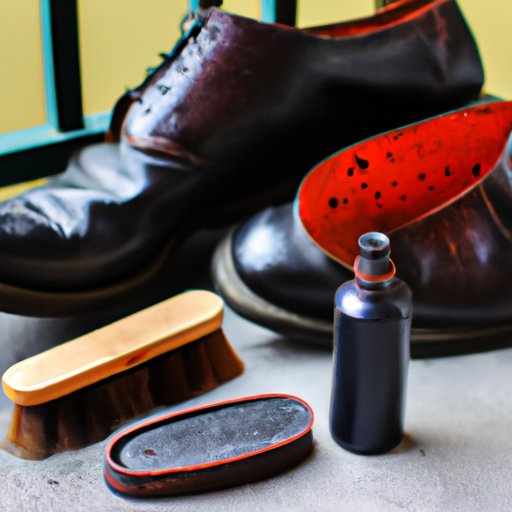
Introduction
As a common problem, anyone who has experienced squeaky shoes knows how annoying it can be. You can’t sneak up on anyone, and the noise can be distracting. There are various reasons why shoes might squeak, from incorrect fit to worn-out soles. In this article, we will explore several solutions to stop your shoes from squeaking.
Addressing the Root Cause
Squeaky shoes can be a result of various factors such as incorrect fit, worn-out soles, or even the style they were made in. Addressing the root cause is necessary to completely solve the problem. For shoes that are too tight or loose, adding insoles, foam cushioning, or gel pads can help to adjust the shoe grip and create a more comfortable fit. Worn-out soles can be replaced with new ones, and this is a fast and effective solution. For leather shoes, it’s essential to treat them with wax or oil as they can dry out and start to make noises.
Utilizing Common Household Items
Common household items can also be effective in reducing the friction that causes shoes to squeak. Placing talcum powder or baby powder inside the shoes can help to reduce friction between the sole and the shoe. Fabric softener sheets can also be an effective solution and can be placed inside the shoe for a few hours to help quiet the noise of squeaky shoes.
Opting for Special Products
Adopting products such as shoe spray, wax or oil for leather shoes or rubber-friendly lubricants are notable solutions to stop shoes from squeaking quickly. Specialist shoe spray not only aids in reducing friction but also helps to waterproof the shoe. Wax, oil or jelly-based lubricants can be applied to leather shoes to help keep them supple and soft, and this reduces the noise when walking. Rubber-friendly lubricants can be used on shoes made from synthetic rubber or plastic material. They help to increase the smoothness of the shoe surface that comes into contact with the ground.
Trying Out DIY Solutions
Do it yourself (DIY) solutions can be a great way to reduce the cost of shoe repair but only for specific types of shoes. Applying olive oil or beeswax to the surface can help to lubricate the sole and reduce friction. Beeswax has the added benefit of filling gaps or scratches on leather shoes, thereby eliminating rough edges that can cause noise.
Changing Walking Habits
Changing walking habits may sound like an odd approach, but it can be a solution. Often the way that you walk can create more pressure on the shoe heel, causing it to squeak more. Walking heel-to-toe reduces the pressure and will make your shoe quieter. It is not always an easy change to make, but more practice can certainly help to develop the correct walking gait.
Talking to a Specialist
Finally, consulting with a cobbler or a shoe repair specialist can provide further insights into solving any issues with squeaky shoes. The cobbler can assess the sole and heel condition, as well as offering specific solutions like heel-padding, resoling, or re-waxing to remediate the source of the noise.
Conclusion
In conclusion, addressing squeaky shoes can be a straightforward task with easy solutions like adding insoles to adjust the fit, placing fabric softener sheets into the shoes, using specialist products, trying DIY solutions, adopting excellent walking habits, and consulting a specialist like a cobbler. Some solutions may work better than others for different shoes and various causes of squeaking, but each of them is worth a try. Don’t endure squeaky shoes; you have options that can quickly get rid of the noise and make your shoes quiet as they should be.




